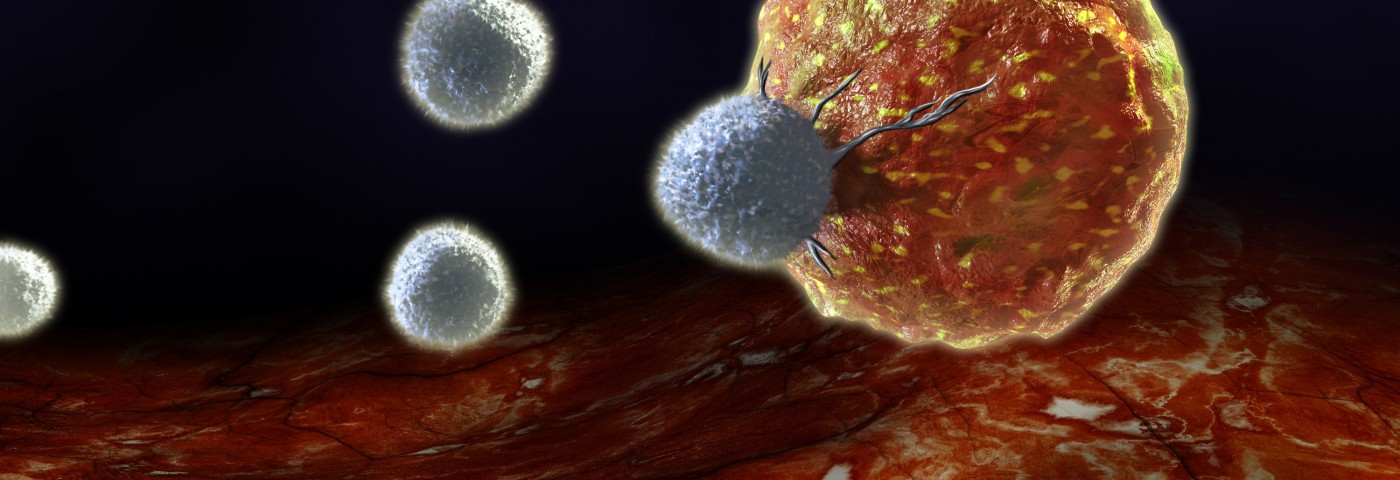The Wilmot Cancer Institute at the University of Rochester has initiated treatment of the first patient enrolled in a clinical trial of CAR T-cell therapy for lymphoma. The therapy has been described as potentially the most powerful cancer treatment developed in years.
Wilmot is one of 16 sites participating in the national, Phase 2 clinical trial investigating CAR T-cell therapy — a method making use of patients’ own immune cells, which are engineered to better fight cancer.
The patient is Ed Foster, 64, of Elmira, New York, a doctor who has diffuse large non-Hodgkin’s B-cell lymphoma. He will remain in hospital for several days following the procedure, to monitor side effects.
Lymphoma patients in the study have exhausted all available options but are still healthy enough to be considered for CAR treatment. Researchers estimate that about 40 percent of those receiving the therapy will respond positively, with cancer going into remission.
Foster received his diagnosis one year ago, and has since gone through standard chemotherapy for diffuse large B-cell disease twice. But his cancer was resistant to the treatment, leaving him with few options.
“I’m surrendering myself to the process, and I feel great,” Foster, a clinician with an internal medicine practice in Elmira, said in a news release. “I’m very optimistic despite there being some unknowns about this treatment. I have not lost a second of sleep over the therapy because, what’s the alternative? The real miracle is that I’m being cared for by the right people, at the right institution, and getting the best therapy possible. I feel like I’m going to the Super Bowl.”
Foster said he has told his own cancer patients to “visualize your body fighting the disease,” an approach he knew researchers were using in their attempts to develop new cancer treatments and that made sense to him. “Now, it’s no longer theoretical. The fantasy is reality — and it has great promise,” Foster said.
The trial differs from other clinical studies in that it will only assess one patient at a time. Most multicenter trials enroll patients and proceed in a relatively independent manner, with many people being treated at any given time. Here, oncologists at the other 15 centers will stand by, waiting for data from each case. If the study is successful, the CAR T-cell therapy could be approved by the U.S. Food and Drug Administration (FDA).
“It’s an immense privilege and endorsement of our program that we were asked to be part of this study,” said Jonathan W. Friedberg, director of the Wilmot Cancer Institute who holds the Samuel E. Durand Chair in Medicine, and is one of the Wilmot study leaders.
“This clinical trial is the first real big test. The reports from the scientific literature from smaller studies tell us that by successfully engineering a patient’s immune cells, you can destroy cancer cells — and that’s very exciting. It’s no longer just science fiction,” he said.
Patrick M. Reagan, a senior instructor and the other study leader, added: “There is a chance this is going to help in a profound way. What’s interesting about the immune system is that sometimes cancers can hide and not be recognized as foreign. CAR T-cell therapy bypasses that problem and directs the immune cells against the tumor specifically.”
The first weeks of treatment will be difficult, as the immune system is expected to react fiercely. Foster will experience a host of side effects while his system fights the cancer.
“It’s really important to have an honest and frank discussion with the patient about this process, step-by-step, all possible outcomes, and the reason you think a clinical trial is the best route,” Dr. Reagan said. An earlier patient who participated in the same CAR T-cell therapy study at another site has died.
While Foster at times had difficulties setting aside his own doctoring mindset, he has surrendered to the care of his clinicians. “There’s been a little bit of denial, a little bit of hope, and some detachment,” he said. “But I’ve come to the realization that I have a lot of people rooting for me.”
“It’s important,” Foster added, “to make people aware that right here in our backyard there’s cutting-edge research that’s not just in the lab but is offering people like me a second chance.”
Foster talks about his cancer and the CAR T-cell therapy in this video.


